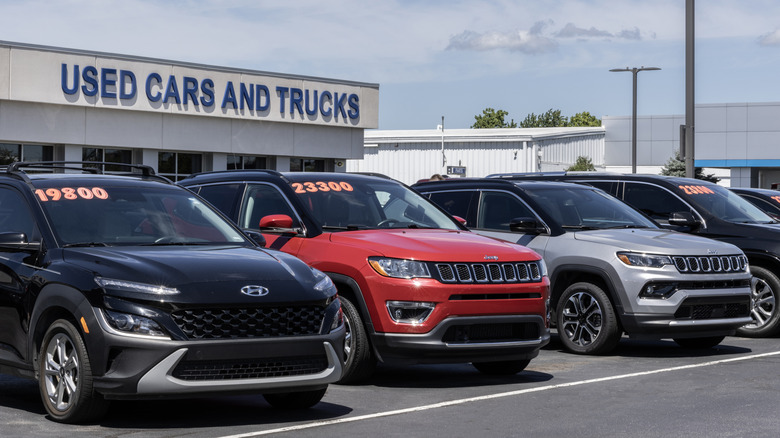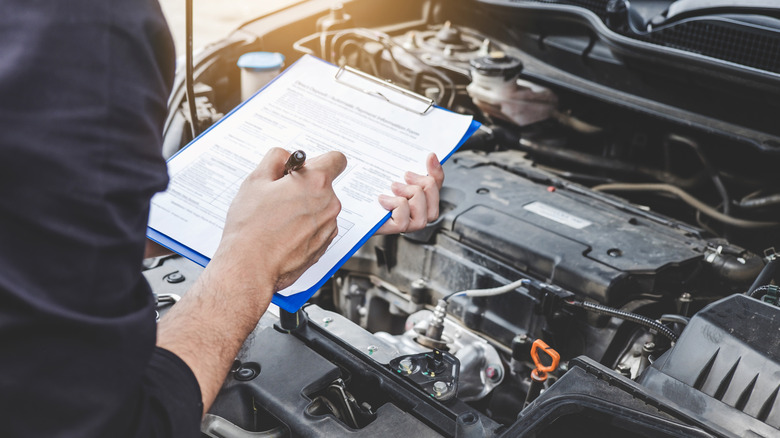Can You Get A Warranty When Buying A Used Car? What You Need To Know Before You Shop
Whether you're a first-time car buyer or veteran shopper, buying a used car can come with significant risks. From dealers putting used cars on the lot even when they have open recalls to sellers rolling back mileage, it's enough to make you feel like you're navigating a minefield before you even get started. While it's important to know what mistakes to avoid when buying a used car, many buyers want some protection in case something goes wrong after the sale and wonder if it's possible to get a warranty for a used car.
While some used cars are covered by an unexpired manufacturer's warranty, many are not. The good news is that there are many warranty options for used vehicles, which can be a relief for used car buyers worried their investment may turn out to be a drain on their bank account. You can think of a used car warranty as a backup that provides extra protection if your vehicle has problems after you buy it and needs repairs.
You're not going to get the level of coverage you'd get with a new car warranty, and if the car you're buying is older or has a lot of miles, it might not qualify for warranty coverage. That being said, many buyers consider getting a used car warranty because it can cut down on potentially budget-busting unexpected repair costs if something goes wrong. However, you'll want to check what's included in the warranty before signing on the dotted line, including how long the coverage lasts and if there are any deductibles or restrictions.
What types of warranties are available for used cars?
Being informed is your best defense against making costly mistakes when buying a used car. One way to do that is by making sure you understand things like whether age or mileage is more important when buying a used car and what kind of warranty coverage, if any, is available. If the used vehicle you're buying is relatively new, it might still be covered by the original manufacturer's warranty. You can often find this information by checking the "systems covered/duration" section of the Buyer's Guide, where some dealers list the specific components and time frames covered under any remaining warranties.
Another common option is a certified pre-owned (CPO) warranty, which typically comes standard when you buy a vehicle from a dealership. To qualify for the CPO warranty, a vehicle needs to meet specific age and mileage requirements and also pass thorough inspections. A CPO warranty provides additional coverage for your vehicle by extending the original warranty and might include perks like roadside assistance and vehicle exchange programs. Be sure you review the terms and conditions of the CPO warranty because coverage varies from one manufacturer to another.
Depending on the state you live in, your used vehicle may come with what's known as an implied warranty. As the name suggests, these warranties aren't put in writing. Even so, in some states, an implied warranty may cover a used car for up to four years. State consumer protection laws put these implied warranties in place to ensure that used vehicles are fit for sale and free from significant defects. However, if you buy a used car "as-is," it won't be covered. You also have the option of buying an extended warranty that provides extra coverage beyond any existing warranties through a third-party company.
What you need to know about warranties when buying a used car
Whether the warranty is already included with the car you're buying or you're thinking about purchasing extra coverage, before you finalize anything, you want to be sure you know exactly what you're getting. There are a lot of different warranties available for used car buyers, and not all of them are the same. Keep in mind that most used car warranties come with specific exclusions. The warranty may cover major components like the transmission, while excluding things like brake pads and tires.
You should also pay close attention to the length of the warranty, something that can vary significantly. You'll find some warranties last only a few months, while others last several years or until you reach a specific mileage limit. You can use this information to plan for potential repairs. In some cases, you might happen upon a used car you like that has a transferable warranty, meaning the remaining coverage can move over to you when you buy the vehicle. Unfortunately, this isn't the case with all warranties, and you'll want to do some research to make sure there aren't any restrictions that make some parts of the warranty non-transferable.
If you're thinking about purchasing a third-party warranty, be sure to do your homework and look into the provider's reputation. While this approach isn't foolproof, you can get an idea from ratings and reviews about whether the provider has good customer service and a history of honoring claims. Before you make your decision, it can be helpful to do a cost-benefit analysis to determine whether the cost of the warranty justifies how much you'd pay for potential repairs. If you're buying a reliable used car, you might not need an extended warranty.


